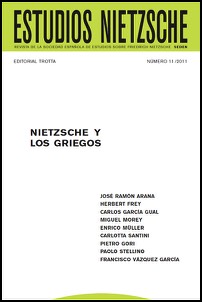Nietzsche: from Heraclitus to the World
DOI:
https://doi.org/10.24310/EstudiosNIETen.vi11.10496Keywords:
innocence of becoming, world play, world, will to powerAbstract
A new method in studying Nietzsche is attempted in this article: connecting the deep structure of his thinking with his external manifestations in the form of works. This methodology is specially indicated in Nietzsche due to the continuous variations in his thinking. It is applied to only one aspect: his junior interpretation of Heraclitus in comparison with his mature conceptualization of «world». While his maturity texts clarify and
develop ideas of his youth works, these last ones frame the possible interpretation of his maturity works, without loosing originality neither of them: they explain each other.
Downloads
Metrics
References
Arana, J. R., Arana, Hermenéutica contemporánea occidental, San Sebastián: Universidad del País Vasco, 2007.
Colomina Alminyana, J. J., «Nietzsche y Heráclito», en Éndoxa 23 (2009), 177-190.
Crawford, C, The Begining of Nietzsche´s Theory of Lenguage, Berlin: De Gruyter, 1988. Klossowski, P., Nietzsche y el círculo vicioso, trad. de I. Herrera, Madrid: Arena Libros, 2004.
Gómez Pin, V., (coord.), Categorías e inteligibilidad global. El proyecto ontológico a través de la reflexión contemporánea. Actas del Primer Congreso Internacional de Ontología, Barcelona: Universitat Autònoma de
Barcelona, 1994.
Heidegger, M. , Grundfragen der Philosophie. Ausgewählte Probleme der Logik (1937 - 1938), ed. de F. W. von
Hermann, en Gesamtausgabe, II, B, vol. 45, Frankfurt am Main: V. Klostermann, 1984.
Heidegger, M., Identität und Differenz, Tübingen 1957,
Heidegger, M., Nietzsche, trad. de J. L. Vermal, Barcelona: Ediciones Destino, 2005. . Sánchez Meca, D., El nihilismo. Perspectivas sobre la historia espiritual de Europa, Madrid: Síntesis, 2004.
Hershbell, J. B., - S. A. Nimis: «Nietszche and Heraclitus», en Nietzsche-Studien 8 (1979), 17-38.
Jaspers, K., Nietzsche. Einführung in das Verständnis seines Philosophierens, Berlin: De Gruyter, 31950.
Kouba, P., El mundo según Nietzsche. Interpretación filosófica, trad. de J. A. Sánchez, Barcelona: Herder, 2009.
Löwith, K., Nietzsche´s Philosophie des ewigen Wiederkehr des Gleichen, Berlin: Verlag Die Runde, 1935.
Nehamas, A., Nietzsche: Life as Literature, Cambridge MA: Harvard University Press, 1995.
Nietzsche, F., Obras Completas, I-IV (OC ). Director ed. Diego Sánchez Meca. Madrid: Tecnos, 2011-2016
Nietzsche, F., Correspondencia I-VI. (CO). Director ed. Luis E. de Santiago Guervós. Madrid : Trotta, 2005- 2012.
Nietzsche, F., Fragmentos Póstumos I-IV (FP). Director ed. Diego Sánchez Meca. Madrid: Tecnos, 2006-2010.
Richardson, J., Nietzsche´s System, New York - Oxford: Oxford University Press, 1996.
Santiago Guervós, L. E. de, Arte y poder. Aproximación a la estética de Nietzsche, Madrid: Trotta, 2004.
Schopenhauer, A., El mundo como voluntad y representación, ed. de R. R. Aramayo, Barcelona: Círculo de
Lectores, 2003.
Downloads
Published
How to Cite
Issue
Section
License
As of issue 21 (2021) this journal is published only in open access (diamond route).
From that number 21, like the previous numbers published in NIETZSCHE STUDIES, they are subject to the Creative Commons Acknowledgment-NoComercia-ShareIgual 4.0 license, the full text of which can be consulted at <http://creativecommons.org/licenses/by-nc-sa/4.0 >
It is the responsibility of the authors to obtain the necessary permissions of the images that are subject to copyright.
This work is licensed under a Creative Commons Attribution-NonCommercial-ShareAlike 4.0 International License.
Copyright generates two different rights: moral rights and patrimonial rights that EJFB recognizes and respects. Moral rights are those relating to the recognition of the authorship. They are rights of a personal nature that are perpetual, inalienable, unseizable and imprescriptible as consequence of the indivisible union of the author and his/her work.
Patrimonial rights are those that can be derived from the reproduction, distribution, adaptation or communication of the work, among others.







11.png)
